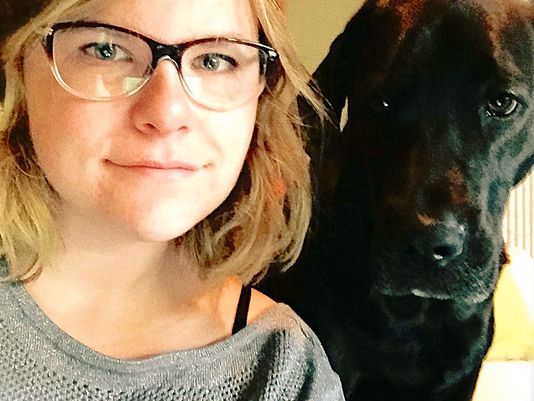She went to Whole Foods for cashew butter and came home with an eight-week-old black lab/hound mix that would change her life.
It was a snap decision for Leah Wyman. She didn't even call her husband. She just knew.
And chances are, if she hadn't brought home the dog they call Marvin, he would have been euthanized by now.
He doesn't like people, other than Wyman and her immediate family. He growls and barks and if not heeded, nips at people. Children, forget it. Middle-aged men, them too.
He is a dog with extreme aggression fueled by fear from whatever abuse was inflicted when he was weeks old.
Each year across the country 800,000 dogs like Marvin are put to sleep. Unnecessarily, said Dr. Sharon Crowe-Davis, a behavioral veterinarian at the University of Georgia College of Veterinary Medicine who is working with Wyman and Marvin.
It takes patience and time and hard work, and sometimes it doesn't work.
Last year, in Greenville County alone, 475 people received dog bites bad enough that they sought treatment in the Greenville Health System's emergency rooms. No one knows precisely how many people are bitten, but the Centers for Disease Control estimates one in five require medical attention, making the number of bites here yearly in the thousands.
Law enforcement investigated about 500 calls about aggressive dogs last year, reports show. Five cases were sent to a magistrate for consideration, county records show.
What would be more likely to happen — and lawyers say this, too, is rare, is someone who is bitten would sue the dog owner in civil court. Like most states, South Carolina holds the owner liable for any harm his dog causes, whether it happens in his home or in a public place. But there is an unusual twist. An owner is not liable if the injuries are the result of the person taunting the dog.
Blake Smith, who has handled a few dog bite cases, said once an owner could avoid liability if the dog had never shown aggression before, but that is no longer a defense. A dog owner could be held responsible for medical bills, lost wages, future expenses.
Wyman knows the risk but she has taken extreme precautions so Marvin's life could be spared.
"I can't imagine life without Marvin," she said. "Marvin rescued me."
The girl
Wyman was born in Greenville and lived with her parents, Donna and Jack and sister, Maggie, in Gower Estates. When she was 5, Fluor transferred her father to Chicago and the family settled in suburban Naperville. Leah was in the ninth grade when the family returned to Greenville.
Dogs were considered family members in the Wyman household — Aspen, a German shepherd mix; Beauty, a sheltie; McKenna and Scooter, Yorkies.
"Always a dog person," Wyman said.
She was a natural performer — a singer who acted and composed music. After two years at Greenville High School, she decided she wanted to go to the Fine Arts Center fulltime to study theater, voice and music theory. She worked with the legendary voice teacher Michael Rice, as an apprentice at the Warehouse Theatre and was homeschooled by her mother.
She took a year off after graduating, attended Converse College for a year then enrolled at the Manhattan School of Music in New York City, where she met her future husband Jon Rouse, a bassist. They married in 2010 and settled in Greenville, where Wyman was the music director at Grace Covenant Presbyterian Church and Rouse played for various regional symphonies, including Greenville's.
They adopted a Yorkie about eight months after they married. They named her Annie, after one of Wyman's favorite singers, Annie Lenox.
The dog
Marvin, then named Marlin, was huddled in a cage outside Petco when Wyman arrived for the cashew butter in November 2012. He was a black furry thing not much bigger than a cantaloupe. They changed his name because Marlin is a fish, not a happy fun-loving lab/hound.
He'd lick toddlers in the face and romp around the yard. He had spend-the-night parties with other dogs and went to the dog park to enjoy the company of other dogs.
Everything changed when he was about six months old. A neighbor from across the street came over and Marvin snapped at him. When they took Marvin to the vet to treat an ear infection, the doctor couldn't get close enough to get a sample.
He ripped a dog crate to shreds. He became afraid of thresholds. And small turtles. He growled — big and deep — if anyone came near an object he had taken as his own, a dog toy, a sock or even a plastic fork.
"I can get in his face and play with him, but if he had a plastic fork he had fixated on, I wouldn't get near him," Wyman said.
Marvin attacked Annie.
The vet grew concerned.
"This trend is not going in a good direction," she said. Wyman and Rouse needed a behaviorist.
The program
The University of Georgia College of Veterinary Medicine Behavioral Medicine Service resides in a non-descript brown building at the rear of the stately brick and columned vet school on the Athens campus. Once, the clinic had two veterinarians who specialized in animal behavior. Funding wasn't approved to replace the one who left. That left Sharon Crowe-Davis, who has been studying, teaching and researching animal behavior for 36 years.
She's worked with cats, dogs, rabbits, parrots, horses and has been published in various medical journals more than 400 times. Her caseload of 10 to 20 animals a week means she cannot take on new patients. She and her students observe the animals, usually for several hours.
Her job is as much to train people as to look after the dog. And she said in most cases the trauma dogs have faced — either in a puppy mill, through poor socialization or abuse from what she calls "scary human monsters" — can be overcome with proper training.
Humane, kind, consistent training.
She doesn't believe in training that involves hitting or spanking an animal, taking its food away or any other technique to prove the human has dominance over the dog.
"That's an antiquated idea," she said.
Most dogs that are aggressive are aggressive because for one reason or another, they are afraid.
It's not abuse only that causes a dog to become aggressive. Abandonment can prompt it as well.
"Dogs are a very social species and they form social bonds," she said.
In Marvin's case, it's hard to tell what happened to him. Wyman found marks on him when she adopted him that she now thinks are burn marks. There were scars on his face.
"Our best guess is he had a traumatic experience and they had a honeymoon period because he was out of a bad situation," Crowe-Davis said. "As he matured his early experiences came back."
Just as with soldiers coming back from war, PTSD sometimes manifests months, even years later.
Crowe-Davis prescribed a standard treatment of basket-muzzle training, relaxation exercises, learning basic commands such as drop it, leave it, with treat rewards and medication.
It was also important that he be given mental exercise, she said. Toys, walks.
Wyman and Rouse were all in. They worked with Marvin every day and before long he could go on walks. Learning to accept the muzzle took away the fear that he could hurt someone.
They gave him a wooden puzzle that held treats to stimulate his mind. He picked it up and smashed it into small pieces.
"He found one way to get the treats," Wyman said.
Steadily, Marvin improved.
A new life
Last August, Wyman and Rouse separated. Their divorce will be final within the next few months. Marvin took some steps back.
"His pack leader was gone," Wyman said.
They moved in with Wyman's parents in the Cleveland Forest neighborhood. Annie and Marvin joined 6-pound Emma, a Yorkie.
Marvin will tear up most every piece of paper and cardboard he finds, including toilet paper on a roll. He takes as his own any socks he finds. He's snapped up whole filets and pork chops from the kitchen counter.
He wears the muzzle whenever he's around the little dogs. They eat in separate rooms. Marvin has nipped at Wyman's parents. Even Wyman's friends wonder why she endures this life, this animal.
They remind her she'll never be able to date a guy with a dog or they ask what she will do if she decides to go to graduate school. She was offered a position as a photographer in Costa Rica this winter but likely won't be able to take it because she can't ask her parents to care for Marvin for months.
No boarding facility will take him. Years ago, Crowe-Davis heard of a place out west — Colorado perhaps — that took aggressive dogs but the wait list was years long.
"It never worked out for any of my clients," she said.
Instead, the vet said Wyman's best hope is to find a caregiver willing to take on all that Marvin brings. Wyman knows it's asking a lot.
Outside
On a recent sunny weekday morning, Marvin is with Wyman and Wyman's mother outside the Swamp Rabbit Café. He has crawled under a picnic table. Wyman grips his leash as she recounts the trials and tribulations of living with Marvin.
He seems so calm. Appearances are deceiving. Just getting to the café was a struggle. He doesn't like to ride in the car. They had to pick him up.
Occasionally people walk outside the medical office next door, Marvin growls. Wyman's mother hands him a training treat. They have so many bags of treats it seems like the pet store must have empty shelves.
A little girl wearing a paper crown starts to walk toward Marvin. He leaps up. Stop, they say, kindly, and the girl stares at the dog, certainly wondering why this dog that looks so cute and sweet can't be petted. They give him another treat. He lies down.
Wyman thinks back to the first days after her husband left. The times when she was the saddest, Marvin seemed to know. He would jump on the bed and put his head in her lap.
"He can sense when I need him. He's there," she said.
But there is no break. Crowe-Davis told Wyman the dog will control the next 10 years of her life. And, as Crowe-Davis does with all clients, she counsels them there may be a time when the dog's life becomes so limited, he has no quality of life.
"Marvin is never going to be the dog you take to the 4th of July parade," Wyman said.
The day at the café is a win for Marvin. No serious aggression for the hour or so he's there. And when they leave he jumps into the backseat, unaided.
LEARN MORE
More information about the University of Georgia College of Veterinary Medicine Behavioral Medicine Service can be found at
.


